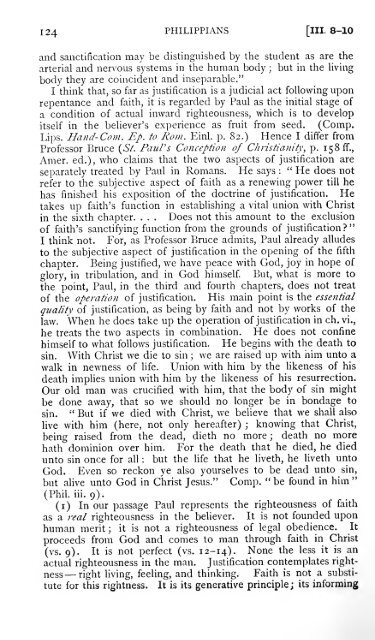Philippians and Philemon - MR Vincent - 1906.pdf
Philippians and Philemon - MR Vincent - 1906.pdf
Philippians and Philemon - MR Vincent - 1906.pdf
Create successful ePaper yourself
Turn your PDF publications into a flip-book with our unique Google optimized e-Paper software.
124 PHILIPPIANS [ill. 8-10<br />
<strong>and</strong> sanctification may be distinguished by the student as are the<br />
arterial <strong>and</strong> nervous systems in the human body ; but in the Hving<br />
body they are coincident <strong>and</strong> inseparable."<br />
I think that, so far as justification is a judicial act following upon<br />
repentance <strong>and</strong> faith, it is regarded by Paul as the initial stage of<br />
a condition of actual inward righteousness, which is to develop<br />
itself in the behever's experience as fruit from seed. (Comp.<br />
Lips. H<strong>and</strong>-Corn. Ep. to Rom. Einl. p. 82.) Hence I differ from<br />
Professor Bruce {St. PauVs Conception of Christianity, p. 158 ff.,<br />
Amer. ed.), who claims that the two aspects of justification are<br />
separately treated by Paul in Romans. He says : " He does not<br />
refer to the subjective aspect of faith as a renewing power till he<br />
has finished his exposition of the doctrine of justification. He<br />
takes up faith's function in establishing a vital union with Christ<br />
in the sixth chapter. . . , Does not this amount to the exclusion<br />
of faith's sanctifying function from the grounds of justification?"<br />
I think not. For, as Professor Bruce admits, Paul already alludes<br />
to the subjective aspect of justification in the opening of the fifth<br />
chapter. Being justified, we have peace with God, joy in hope of<br />
glory, in tribulation, <strong>and</strong> in God himself But, what is more to<br />
the point, Paul, in the third <strong>and</strong> fourth chapters, does not treat<br />
of the oper-ation of justification. His main point is the essential<br />
quality of justification, as being by faith <strong>and</strong> not by works of the<br />
law. When he does take up the operation of justification in ch. vi.,<br />
he treats the two aspects in combination. He does not confine<br />
himself to what follows justification. He begins with the death to<br />
sin. With Christ we die to sin ; we are raised up with him unto a<br />
walk in newness of life. Union with him by the Ukeness of his<br />
death implies union with him by the likeness of his resurrection.<br />
Our old man was crucified with him, that the body of sin might<br />
be done away, that so we should no longer be in bondage to<br />
sin. " But if we died with Christ, we believe that we shall also<br />
live with him (here, not only hereafter) ; knowing that Christ,<br />
being raised from the dead, dieth no more ; death no more<br />
hath dominion over him. For the death that he died, he died<br />
unto sin once for all : but the Ufe that he liveth, he liveth unto<br />
God. Even so reckon ye also yourselves to be dead unto sin,<br />
but alive unto God in Christ Jesus." Comp. " be found in him "<br />
(Phil. iii. 9).<br />
(i) In our passage Paul represents the righteousness of faith<br />
as a real righteousness in the believer. It is not founded upon<br />
human merit ; it is not a righteousness of legal obedience. It<br />
proceeds from God <strong>and</strong> comes to man through faith in Christ<br />
(vs. 9). It is not perfect (vs. 12-14). None the less it is an<br />
actual righteousness in the man. Justification contemplates rightness—<br />
right living, feeling, <strong>and</strong> thinking. Faith is not a substitute<br />
for this Tightness. It is its generative principle; its informing





